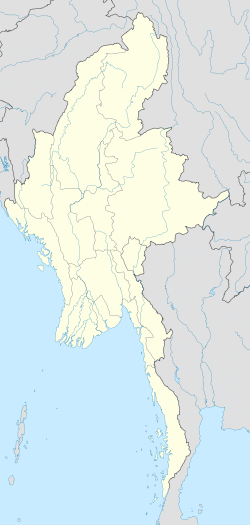Thonze
Thonze သုံးဆယ်မြို့ | |
|---|---|
Town | |
 Thonze Clock Tower | |
| Coordinates: 17°37′40″N 95°47′14″E / 17.627806°N 95.787125°E | |
| Country | |
| Region | |
| District | Tharrawaddy District |
| Township | Tharrawaddy Township |
| Area | |
| • Total | 3.05 sq mi (7.9 km2) |
| Population | |
| • Total | 22,482 |
| • Density | 7,400/sq mi (2,800/km2) |
| Time zone | UTC+6.30 (MMT) |
Thonze (Burmese: သုံးဆယ်, also spelt Thonse) is a town in Tharrawaddy Township in western Bago Region, Myanmar. The town borders the town of Tharrawaddy's south side. It is divided into 13 urban wards and had a population of 22,482 people in 2019.[1]
History
[edit]During British colonial rule, Thonze was a logging hub where the taungya variety of teak was first grown in plantation style. In 1883, the Thonze forests were mapped and divided into compartments for the purpose of creating forest resource reserves.[3] The missionary Marilla Baker Ingalls settled in Thonze in 1859, describing it as a remote village, requiring a two-day boat trip from Rangoon up the Hlaing River. She set up a mission and created a community of Baptists through her life in the village.[4] The first rail line to Thonze was built in 1877, and the village grew into a station town.[5]
References
[edit]- ^ a b Myanmar Information Management Unit (September 2019). Thayawady Myone Daethasaingyarachatlatmya သာယာဝတီမြို့နယ် ဒေသဆိုင်ရာအချက်လက်များ [Tharrawaddy Township Regional Information] (PDF) (Report). MIMU. Retrieved 4 September 2024.
- ^ GoogleEarth
- ^ Blanford, H.R. (March 1958). "Highlights of One Hundred Years of Forestry in Burma". Empire Forestry Review. 37 (1) 91: 33–42. JSTOR 42600438.
- ^ Gracey, Mrs J. T. (1898). Eminent Missionary Women. Eaton & Mains. pp. 196–201. ISBN 978-0-8370-6056-9. Retrieved 4 June 2022.
- ^ Kaloyanides, Alexandra (2016). "'Show Us your God': Marilla Baker Ingalls and the Power of Religious Objects in Nineteenth-Century Burma". Religions. 7 (7) 81. Ho Center for Buddhist Studies. doi:10.3390/rel7070081.


 French
French Deutsch
Deutsch

